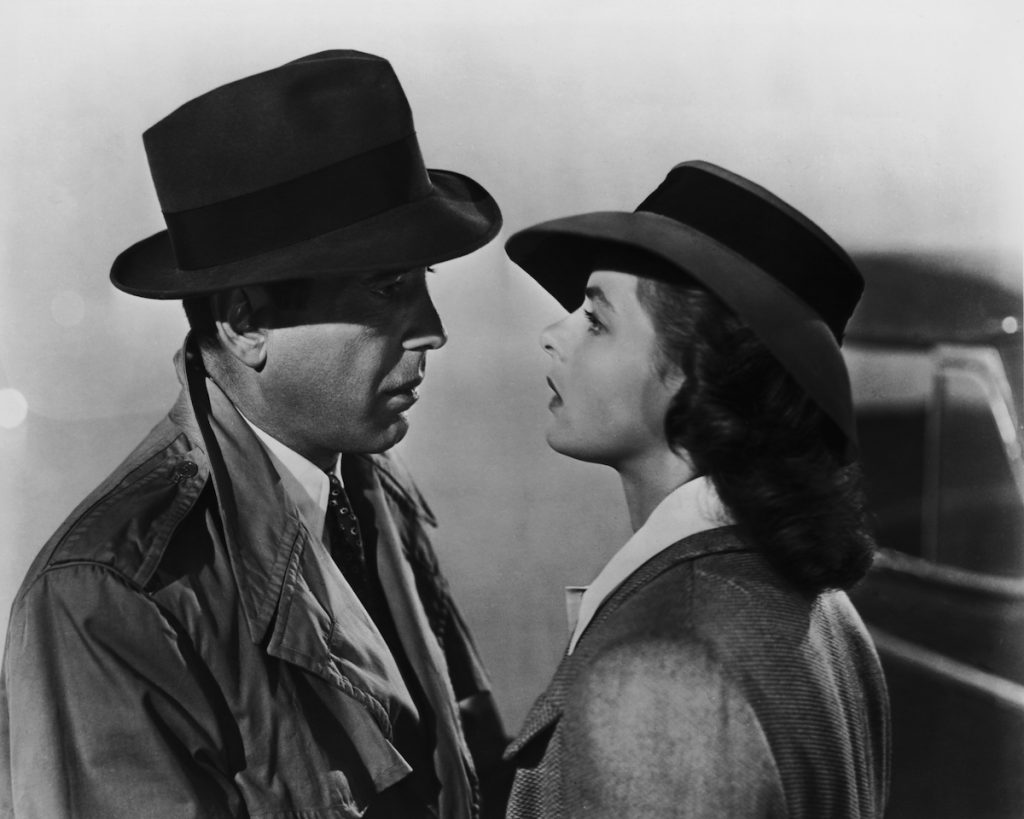
When HBO Max deputed on May 27, I subscribed immediately, primarily because several of my favorite old movies such as “Casablanca” and “Gone With Wind” were being offered. I hadn’t seen either movie in over 20 years, and I thought I that while being stuck in my house in New York I would be able to catch up.
Old people like me (I’m 88) tend to get nostalgic in their dotage and go back to their favorite music, especially music they danced to in their junior and senior proms, and return to movies they loved in those same years. In that halcyon time I listened to Frankie Laine, Billy Eckstine and my favorite, Louis Armstrong. I had dozens of Louie’s songs on 78″ wax records.
My favorite movie in those years was “Casablanca,” which I first saw when I was 10 years old. And in my in teenage years I loved it because it was so romantic — ” A kiss is still a kiss…” I fell madly in love with Ingrid Bergman — she replaced Kathryn Grayson as my ideal woman, and, of course, I was Rick Blain — a mysterious man who women found irresistible.
In 1994 I had been at the University of Missouri for six years, so I had earned a sabbatical — a semester off with full pay. I spent my sabbatical doing research on how to write a screenplay and wrote a script that was a sequel about Rick in 1968 operating a disco in Paris and running into Ilsa and Victor and their two children. I wrote it because I wanted to know what happened to Rick and Ilsa and what kind of lives they led without each other.
In May of 1999 when I was working for AOL, my boss, Myer Berlow’s, wife set me up on a blind date with a woman, Julia Bradford, who had recently been divorced. Myer’s wife, Deborah, told me that Julia was a school teacher who lived on the Upper East Side and was much younger than I was. Deborah also told me that Julia was concerned about our age difference but was willing to go out with me because it was “good dating experience.” On our first date, I took her to Palm Too where my cartoon was still on the wall from when I had been General Manager of WNBC-AM in 1977-79. Naturally, I wanted to try to impress Julia with my tattered, faded fame.
I immediately liked Julia, and we had a far-ranging, lively conversation as we got to know each other better. At one point in the conversation, I asked Julia when her birthday was. “January 22, 1949,” she unhesitatingly told me. Trying to calculate the age difference, I wrote my birthday down — February 23, 1932. I’ve never been good at math, but I managed to scribble a subtraction — 17 years. I was desperate to think of something that would minimize the age difference because I really liked this intelligent, honest woman. I stared at the dates, and suddenly the perfect argument came to me. “Do you realize that we are exactly the same age apart as Humphrey Bogart and Ingrid Bergman were in “Casablanca.”
Bingo! I overcame the age objection. On our fourth date we watched “Casablanca” together, and on our fifth date I asked Julia to marry me. We got married the following January. Guess where we went on our honeymoon? Paris, of course. We’ve had a marvellous marriage for 21 years, and I probably have my knowledge of “Casablanca” at least partially to thank for it.
Therefore, on May 27, when I subscribed to HBO Max, I watched “Casablanca” for the umpteenth time. But here’s what I saw in 2020.
The protagonist, Rick Blaine, was a cafe and casino owner who, when Major Strasser asks him his nationality, replies “drunkard.” Rick runs a crooked gambling casino where he and his croupier can fix the winning numbers on the roulette wheel. Rick also uses his crooked casino to let a totally (self-identified) corrupt official, Captain Renault, win at roulette and also bribes Renault with free drinks. Furthermore, Rick has a checkered past. Near the beginning of the film, when Renault says, “I’ve often speculated on why you don’t return to America. Did you abscond with the church funds? Did you run off with the Senator’s wife? I’d like to think you killed a man. It’s the romantic in me.” Rick replies, “It’s a combination of all three.” So maybe Rick’s a murderer?
In the classic ending of the film, Rick says, “Louis, I think this is the beginning of a beautiful friendship.” A friendship with a corrupt police chief, who in Harvey Weinstein style, uses his power to demand (and get) sexual favors from women. In today’s #MeToo environment making Captain Renault’s behavior acceptable is anathema.
Rick shows he a “romanticist” by letting a young husband win enough money to bribe Renault by dishonestly fixing two spins of the roulette wheel so the husband’s bride doesn’t have to sleep with Renault to get exit visas. In a previous scene the bride has come to Rick to get his advice about sleeping with Renault, Rick’s callous response is, “Go back to Bavaria,” which is like having the same attitude as Hollywood executives had in enabling Harvey Weinstein — don’t get involved. That scene would not be included in a film today.
The movie’s depiction of Sam is a 1942 stereotype of a grinning, happy-to-be subservient, musically talented black supplicant who calls Rick “Mister Richard.” After Sam plays “As Time Goes By,” and he says to Rick, “We’ll get drunk, we’ll go fishin’,” it just reinforces negative stereotypes of black men in 1942 — lazy drunks. Also, when Rick sells Rick’s Cafe to Signore Ferrari (Sidney Greenstreet), they negotiate Sam’s compensation, and even though Rick gets a good deal for Sam, there’s no getting around the fact that they are buying and selling a black man who has no agency.
And, mentioning agency, what about Ilsa? Today, what do we think about a woman who says, “I don’t know what’s right any longer. You’ll have to think for both of us, for all of us.” Because of the Production Code (the Breen Office) in effect in 1942, the scene in which Ilsa, who can’t resist her overpowering feelings, goes to Rick’s office to get the Letters of Transit. The scene is purposely ambiguous as to whether or not Ilsa sleeps with Rick. I think the clear implication is that she does. If so, what do we think about Rick ratting her out to Victor in the final, iconic airport scene in which Rick says to Victor, Ilsa’s husband, “You said you knew about me and Ilsa.” Victor says, “yes.” Rick says, ” But you didn’t know she was at my place last night when you were. She came there for the Letters of Transit. Isn’t that true, Ilsa?” Ilsa replies, “Yes.” Rick continues, “She tried everything to get them and nothing worked. She did her best to convince me that she was still in love with me. But that was all over long ago. For your sake she pretended it wasn’t, and I let her pretend. Victor says, “I understand.” What are the chances today of a boyfriend ratting out a wife’s unfaithfulness to a husband and the husband saying, “I understand.”
In the current climate of #MeToo and Black Lives Matter, “Casablanca” could not be made today. No studio would accept the script.
Watching the movie 78 years after it was made, my sensitivities and identity have changed radically, and I see “Casablanca” in a new perspective and evaluate it differently. Does this mean that: 1) HBO Max should take down “Casablanca” like it did “Gone With the Wind” and 2) with all of its flaws should we still love a movie and its war-time message of the inherent altruism (“we” versus “me”) of the human spirit and the nobility of sacrifice in wartime?
No to #1 and yes to #2. With all of its flaws, we need the gooey romanticism of “As Time Goes By,” and we absolutely need to know that “We’ll always have Paris.”
